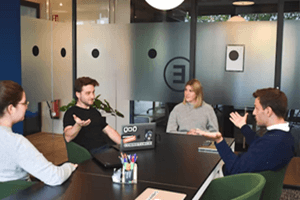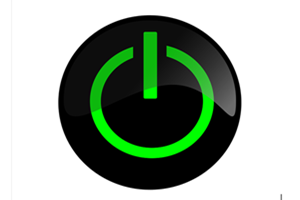Question
I just had a series of second interviews for a management position. Feedback was very positive and they came back pretty quickly to ask me to meet with my potential boss’s boss. I sent thank-you notes last night, reiterating some points that we discussed. I also sent one to the original person (my potential manager) who arranged the interviews. I feel good about this position and I think it shows in my confidence and attitude. I believe it’s down to two other candidates and me. What should I expect and how should I prepare to stand out from my competition in the final interview round? Thank you!
Nick’s Reply
 Congratulations on taking it this far. Now, don’t over-analyze it. Whatever you did in the first two rounds worked very well. Do more of it.
Congratulations on taking it this far. Now, don’t over-analyze it. Whatever you did in the first two rounds worked very well. Do more of it.
Influence
Due diligence is necessary before accepting a job, and it also helps pave the way to a job offer. For example, meet key people in departments that are connected to the department you would work in. That’s how to get the inside story about whether a company is worth joining. But everyone you meet within a company is also a potential mentor, and they can all influence the company to hire you.
That’s why the more insiders you meet, the better you’ll be able to compete against those other two candidates. It takes more than thank-you notes. Let me explain.
Be that candidate
In the throes of the interview process, job hunters often lose sight of a simple fact: The employer wants to hire you. The boss wants you to be the best and final candidate so he can end the interviewing process and get back to work himself. While the hiring manager wants to quiz you, he also hopes you will take the initiative to stand out and reveal that you are the blessing the company has been waiting for.
Consider this: Would a manager rather conduct 20 formal, contrived interviews with ten candidates, or go for a long walk with one capable, articulate, motivated person who understands the business, asks insightful questions, presents well-thought-out ideas, and demonstrates the initiative to put those ideas to work? Imagine what that dialogue would be like for the manager. Be that candidate. Step out of the conventional interview process and talk shop with the boss.
HOLIDAY DEAL
Order any Ask The Headhunter e-book during the winter holidays and get 50% off your entire purchase. Enter discount code 2022XMAS at checkout. Limited time offer. Happy Holidays! Order now!
Prepare to meet the big boss
Here’s how to stand out in the final interview with the boss’s boss. Forget about sending any more notes. Instead, call the boss who already interviewed you and thank him for the stimulating meetings you just had. Then explain that you’re preparing for your meeting with his boss.
How to Say It
“The more I study your business, the more engrossed I become. I’m looking forward to meeting [your boss], and I’m glad to answer any questions she has so she can evaluate me. But I’d like to make the meeting more profitable than that. I’d like to get into the heart of your business and discuss how I think I can help. But I don’t want to be presumptuous and I certainly don’t want to seem like I’m trying to commandeer the meeting.“May I ask for your insight and advice? Would your boss welcome a mini-business plan about how I’d do this job? Or, how would you suggest I demonstrate my value?”
Then be quiet and listen.
How to influence your final interview
If the boss encourages your approach, show off your initiative:
- Explain that you would like to outline to his boss a brief business plan about how you will do the job.
- Ask the boss to confirm the assumptions you’ve made.
- Ask for any additional business- and work-related information you need to develop your presentation for the big boss.
If he responds positively, you’ll have all you need for your upcoming interview, and you will also have a new advocate. You can make similar calls to other team members and managers you’ve already met. Each not only becomes your advisor — each might influence the decision to hire you.
Role of influencers
When I schedule a candidate to meet with my client to talk about a job, I try to schedule multiple meetings with key influencers in the organization. I explain to the hiring manager that this will provide more data points on which to assess the candidate. Then I prep the candidate along the same lines I’m prepping you — emphasizing that if the candidate can attract one or more “mentors” in the process, then the odds of a good job offer go up dramatically. (For an extended discussion of the parameters of influence please read Robert Cialdini’s excellent book Influence: The Psychology of Persuasion.)
The larger the web of people you talk shop with, the more you influence the big boss to hire you. If you can pull this off, you will truly stand out from your competition. Is there a risk in this? Sure. You might find out that you’re dealing with people who don’t value initiative. The boss may not be willing to coach you. That suggests how he treats his employees, too.
Stand out in your final interview
On the other hand, if you play it safe and don’t make this effort, you risk being just another indistinct job candidate. In my opinion, a candidate who takes the initiative to engage the boss and his team should score big points, or look for a different employer.
It’s up to you, because the risk is yours to take. My advice is to stand out in the final interview with the boss’s boss by getting all the coaching you can from other insiders.
How many times have you made it to the final interview — but no job offer? What 3 things could you have done in advance to influence the hiring manager’s decision? How do you prepare for a final interview round?
This edition is reprinted from Fearless Job Hunting, Book 6 – The Interview: Be The Profitable Hire, pp. 19-21. Learn how to overcome the daunting obstacles that stop other job hunters dead in their tracks — and get 50% off on all Ask The Headhunter e-books! Enter discount code 2022XMAS at checkout. Limited time offer. Happy Holidays! Order now!
NOTE: This is the last edition of Ask The Headhunter for 2022. See you next time, after the holidays, in the January 10, 2023 edition! Happy Holidays!
: :




 Thanks for your kind note. You have hit on a very simple but profound idea, and I’ll take it to the next step for you. People need to be job hunting all the time. Not heavily, but persistently.
Thanks for your kind note. You have hit on a very simple but profound idea, and I’ll take it to the next step for you. People need to be job hunting all the time. Not heavily, but persistently.
 A while ago I commented on a LinkedIn thread about this very question. It was another round of posts from people touting their 1000+ connections. In my opinion, nobody has 1000 real connections on LinkedIn. They have a phone book.
A while ago I commented on a LinkedIn thread about this very question. It was another round of posts from people touting their 1000+ connections. In my opinion, nobody has 1000 real connections on LinkedIn. They have a phone book.